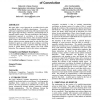Free Online Productivity Tools
i2Speak
i2Symbol
i2OCR
iTex2Img
iWeb2Print
iWeb2Shot
i2Type
iPdf2Split
iPdf2Merge
i2Bopomofo
i2Arabic
i2Style
i2Image
i2PDF
iLatex2Rtf
Sci2ools
GECCO
2005
Springer
2005
Springer
The emulation of social institutions as a method of coevolution
This paper offers a novel approach to coevolution based on the sociological theory of symbolic interactionism. It provides a multi-agent computational model along with experimental results that suggest improved fitness, robustness, and knowledge due to emergent symbol systems. The main contribution of the symbolicinteractionist approach to coevolution is the concept of the e of a system in the abstract, where an interface between agents evolves. The interface is an emergent symbol system that focuses selective pressure among agents in ways that have been beneficial to agents as a whole in the past, creating a coevolving system that takes advantage of epistasis rather than having to prevent it. Global fitness thereby emerges from local, selfish interaction. The assignment of roles in this system is endogenous. Categories and Subject Descriptors I.2.11 [Artificial Intelligence]: Distributed Artificial Intelligence – intelligent agents, multi-agent systems, coherence and coordination. ...
| Added | 27 Jun 2010 |
| Updated | 27 Jun 2010 |
| Type | Conference |
| Year | 2005 |
| Where | GECCO |
| Authors | Deborah Vakas Duong, John J. Grefenstette |
Comments (0)

